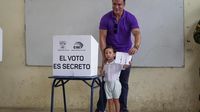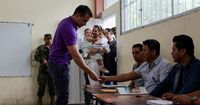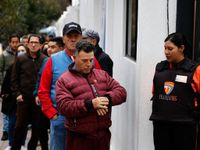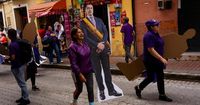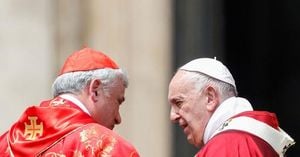On Sunday, April 13, 2025, Ecuadorian President Daniel Noboa took the lead in early returns from the presidential runoff election, securing 56.8% of the vote with about 55% of ballots counted. His leftist rival, attorney Luisa González, garnered 43.2% of the support, according to initial results from the National Electoral Council. The election, marked by concerns over escalating violence and crime, saw over 80% voter participation, reflecting the urgency with which Ecuadorians are seeking solutions to their country's security crisis.
This runoff election was a significant moment for Ecuador, coming just six months after the last presidential contest, which Noboa won in a snap election following the dissolution of the National Assembly by then-President Guillermo Lasso. The candidates advanced to this runoff after securing the most votes in the first round of elections held in February 2025, where Noboa led González by approximately 17,000 votes.
The primary concern for voters in this election has been the rampant violence that has plagued Ecuador since 2021, largely attributed to drug trafficking linked to neighboring Colombia and Peru. Both candidates have promised robust policies to combat crime, including enhanced law enforcement and international cooperation to tackle drug cartels. As Irene Valdez, a retiree who voted for Noboa, expressed, "My vote is clear. I want to continue living in freedom." Meanwhile, college student Martín Constante voiced support for González, stating, "I think Luisa is going to change things, because Noboa has been very authoritarian. Our country needs a lot of changes."
With more than 13 million eligible voters, participation in the election was mandatory for adults up to the age of 65, with penalties for noncompliance. Ecuador’s top electoral authority, Diana Atamaint, reported that 83.7% of eligible voters cast ballots. However, the election was not without its complications; law enforcement authorities seized 56 firearms and arrested over 630 individuals, including those with outstanding warrants for serious crimes.
Reports of ballot anomalies also surfaced, leading to several arrests for double voting and the use of counterfeit ballots. In total, 17 individuals were apprehended for taking photos of their ballots, a practice banned by the National Electoral Council due to concerns of voter coercion by criminal groups.
Political analyst Oswaldo Landázuri noted that the election results could reflect a polarized electorate, with many voters expressing their rejection of past policies rather than a strong endorsement of either candidate. "Ecuador is polarized, which is a sign of rejection of the past, but also of the recent policies of the Noboa administration," he said.
Daniel Noboa, 37, is the heir to a fortune built on the banana trade and has been in office for just over 16 months. He declared a state of "internal armed conflict" in January 2024, enabling him to deploy thousands of troops to the streets in a bid to combat gang violence. Under his leadership, the homicide rate decreased from 46.18 per 100,000 people in 2023 to 38.76 per 100,000 people in 2024. However, this figure remains alarmingly high compared to the 6.85 per 100,000 seen in 2019.
González, 47, has a political background that includes various roles under the presidency of Rafael Correa, who governed from 2007 to 2017. While her supporters reminisce about the lower crime and unemployment rates during Correa's tenure, they often overlook his authoritarian tendencies and the significant debt incurred during his administration. González has positioned herself as a candidate for change, promising to implement social programs and reject foreign military intervention in Ecuador's internal affairs.
As the election unfolded, Noboa's tough stance on crime appeared to resonate with voters, particularly in light of the recent surge in violence, which has seen Ecuador average a homicide every hour at the beginning of 2025. His administration has faced criticism for its heavy-handed tactics, yet many Ecuadorians continue to support his approach to security.
Noboa's campaign has also been characterized by a close relationship with the United States, with his government seeking foreign assistance in the fight against organized crime. In March 2025, he announced a partnership with Erik Prince, founder of the controversial private defense firm formerly known as Blackwater, to bolster Ecuador's security efforts. Documents revealed plans to allow U.S. military forces to operate from a new naval base on the Ecuadorian coast, a proposal that has stirred debate among voters.
Conversely, González advocates for a more community-focused approach to security, emphasizing prevention and social investment. During her campaign, she has criticized Noboa's reliance on military solutions, arguing that true change must come from addressing the root causes of violence.
As the polls closed on April 13, 2025, many voters expressed hope that their choice would lead to a safer and more prosperous Ecuador. Noboa, buoyed by early returns, declared, "Thank you to all the Ecuadorians who bravely went to the polls. Today will be a great day." González, meanwhile, promised to defend democracy and bring about change for the better, stating, "We are going to make history for Ecuador!"
The final results of the election are expected to be crucial not only for the immediate future of Ecuador but also for its long-term stability as it navigates the challenges posed by crime, economic hardship, and political division.

